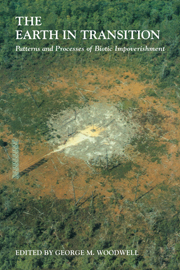Book contents
- Frontmatter
- Contents
- Preface
- Acknowledgments
- List of Contributors
- Part I Global Change and the Patterns of Impoverishment
- Part II Chronic Disturbance and Natural Ecosystems: Forests
- Part III Chronic Disturbance and Natural Ecosystems: Woodlands, Grasslands, and Tundra
- Part IV Chronic Disturbance and Natural Ecosystems: Aquatic and Emergent Ecosystems
- Part V Conclusion: Steps toward a World That Runs Itself
- 25 Steps toward Sustainability
- 26 A Reaction from a Multitude
- Name Index
- Subject Index
26 - A Reaction from a Multitude
Published online by Cambridge University Press: 24 November 2009
- Frontmatter
- Contents
- Preface
- Acknowledgments
- List of Contributors
- Part I Global Change and the Patterns of Impoverishment
- Part II Chronic Disturbance and Natural Ecosystems: Forests
- Part III Chronic Disturbance and Natural Ecosystems: Woodlands, Grasslands, and Tundra
- Part IV Chronic Disturbance and Natural Ecosystems: Aquatic and Emergent Ecosystems
- Part V Conclusion: Steps toward a World That Runs Itself
- 25 Steps toward Sustainability
- 26 A Reaction from a Multitude
- Name Index
- Subject Index
Summary
Introduction
“I am large. I contain multitudes”, said Walt Whitman to explain why he sometimes contradicted himself. Every human being contains multitudes. I have never been more aware of the multitudes within me than at this conference of field ecologists describing their work.I am not a field ecologist. Most of the research reported here is new to me. It strikes me at many levels, revealing both the multitudinousness of my own responses, and the inherent complexity of the planetary ecosystems, which can touch a person in so many ways.
I was trained in biophysics, which, although it is a very different science, allows me to understand and to admire field work, not only for its difficulty (to a lab scientist like me, studies in the Arctic, or under the ocean, or in a peat bog look difficult), but also for its inherent elegance.
I am a systems analyst, and I am fascinated with the feedback systems that have been described here. They are full of synergisms, exponentials, non-linearities; they are beautiful systems. They make me want to run to my computer and start modeling. My systems experience also makes me sensitive to the vital role of information in changing system behavior, a bias that you will find permeating my comments here.
I am a journalist, a syndicated columnist, and I have been wondering how best to communicate in 800 words or less the important stories that were told which the public needs to know about.
- Type
- Chapter
- Information
- The Earth in TransitionPatterns and Processes of Biotic Impoverishment, pp. 513 - 521Publisher: Cambridge University PressPrint publication year: 1991

